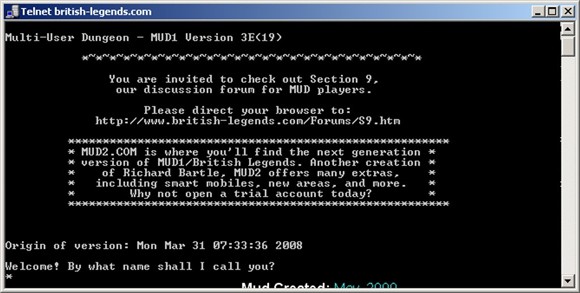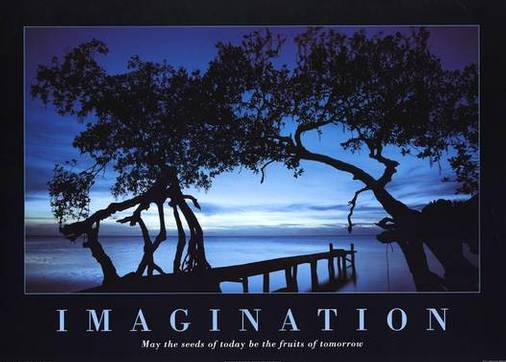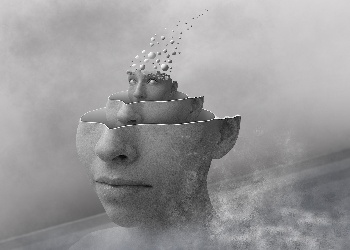This post has not been edited by the GamesBeat staff. Opinions by GamesBeat community writers do not necessarily reflect those of the staff.

Action: Open door.
Action: Pick up torch.
Multi-User Dungeon (MUD) games are special. Some say they’re boring — that they only consist of text-based experience. I disagree.
My experience with MUD games is much like my experience with books. You can picture it in your mind, use your imagination, and pretend. What’s neat is you can make it what you want it to be. You’re seeing what your brain is devising, instead of watching (and playing) a game that’s juiced up with cinemas and narrative. And the characters are, well, whoever you want them to be (in several cases).
The best part, however, is comparing your experience with a friend.
I was young when I first ran into MUDs. My friend was addicted to them, and he insisted that I try them out. I told him they were lame; they were just words without excitement. He proved me wrong.
Around the same time, I was reading Hatchet, one of my favorite books. It reminded a lot of The Legend of Zelda — of a boy lost into the wild who fights to survive all on his own.
Something happened. I became attached to this book. I related to it as I camped out in the woods, acting like a Boy Scout. I wasn’t armed with a weapon, but I was sure to use the character’s tactics in scouting for outdoor threats. From that book, I realized what text can really do. It opened my mind to new ideas.
Here's an example: I’m 5-foot-6, weigh 170 pounds, and have green eyes, short brown hair, a trimmed goatee, and tattoos on both my right and left arm (third on my back).
Did you picture anything?
That’s the beauty of words. People will have so many different perceptions of what kind of goatee I have, what are the tattoos of, and perhaps if my face is serious or smiling. (And for the record, if you think I’m ugly, I’m not!)

Once my friend’s convincing worked, I began to visualize what happened while I played. Many of the titles asked me to picture similar scenes like Shadowgate (because of the torches). Here, I stumbled upon dark hallways, a door at the end, and a skull resting on the floor. (Actually, that skull wasn’t mentioned in the text. I came up with that on my own.) And I imagined that I looked pretty cool with knight armor and wielding a gigantic sword as well. I’m the hero, remember?
My friend and I began drawing out the events of our games. And we expanded upon them. We even made a comic book out of them. We combined the thoughts and pictures in our minds on paper. We discussed what the monsters looked like, what kind of world we were exploring, and even our own plot and purpose of the journey.
It’s a unique way to come up with a story, one that only happens in text-based games.
When I took a class in scriptwriting in college, my professor always thrived to be detailed. You want your audience to picture the events in their heads, to draw them into the story, the scenery, and (don’t forget) the feelings and personalities. What are these people like? Give us a reason to root for the hero or to despise the villain. In a nutshell: Make it believable and something we all can relate to.

I could relate to MUDs. I wanted to keep playing because, in a way, I was picking the outcome. The characters were my real-life friends, and the enemies were the jerks in school. (OK, I didn’t hate them that much, but it seemed to fit). Whatever my imagination was brewing, I could put into pleasurable practice.
Not everyone will enjoy MUD games, especially today’s generation. But when people say the book was far better than the movie, I tend to believe them. It’s a magical way to create your own game with the simple set of letters. Not everything needs pretty graphics or groundbreaking technology.
See, your brain can create an astonishing story that’s far more in-depth than watching a movie or playing a game. Just ask Shigeru Miyamoto and his neat story about exploring the woods, lakes, and caves of his childhood. He turned that simple factor into the Legend of Zelda.
Think about it. Your mind has endless possibilities.
Note: I remember Dan "Shoe" Hsu mentioning MUDs a while back on one of those video episodes he did here on Bitmob. I was inspired by that, and I finally got around to writing about it. I'm still trying to contact my friend that experienced this with me. He probably remembers more than I do.
